Do you have insects and pests, but don’t know how to get rid of them?
Have pests ever killed your plants leaving you frustrated and wanting to quit gardening because nothing ever seems to work?
After much research, trial and error, and talking to experts across the world I have found the perfect solution for YOU!
Below are 10 BEST Insecticides for your Vegetable Garden!
Not only this, but I am providing the different types of pest controls, DIY organic options, and tips for application.
Types of Pest Control
One of the biggest mistakes your average gardener makes when trying to kill pests is purchasing pest control or insecticide without the proper research.
With little or no research, the average gardener ends up purchasing the wrong insecticide for their actual garden and plants.
Because of this, I have compiled a list of different types of insecticides that can be used for your vegetable garden
Insecticides
Insecticides are pesticides used to kill specific insects like ants, snails, wasps, etc. They are typically applied after insects have begun attacking your vegetable garden
Pesticides
Pesticides are chemicals used to control, repel, and kill insects and diseases, such as snails, slugs, fungus, and bacteria. Typically, all the different insecticides on this list are considered pesticides
Herbicides
Herbicides don’t kill insects. They kill weeds. I am putting it on this list though because gardeners commonly mistake herbicides for insecticides, only to be disappointed with the results.
Botanical (Organic)
Botanical insecticides are organic applications that are non-toxic to humans and the environment. As the years have gone by this tends to be a choice for more and more gardeners.
Some examples of store-bought botanical insecticides are spinosad, pyrethrin, and neem oil.
Spinosad
Spinosad insecticides are natural mixtures that are highly toxic to insects, but to nothing else.
This type of insecticide is great for killing thrips, spider mites, mosquitoes, ants, and fruit flies. It typically comes in granular, dust, and spray applications.
In addition, you can typically see immediate results within one to two days.
Pyrethrin
Pyrethrin is an insecticide that is extracted from flowers and is non-toxic to your vegetable garden. It is very effective in killing ants, cockroaches, fleas, true bugs, aphids, caterpillars, flies, and wasps.
In addition, this insecticide quickly disappears from plants and soils after it eliminates pests within a few days.
Neem Oil
Neem oil is another great non-toxic option that has been extra from fruit and seeds. It should be applied before pests have attacked your vegetable garden. This is a great option for controlling both pests and plant disease.
Essential Plant Oil
Essential Plant Oils are the most non-toxic insecticide option on the list. Some examples include cedar, lavender, eucalyptus, citronella, and rosemary.
It should be noted that these are good preventive options, but do not typically kill pests once they attack your vegetable garden.
10 BEST Insecticides (Lowest to Highest Priced)
1. Garden Safe Garden Insect Killer
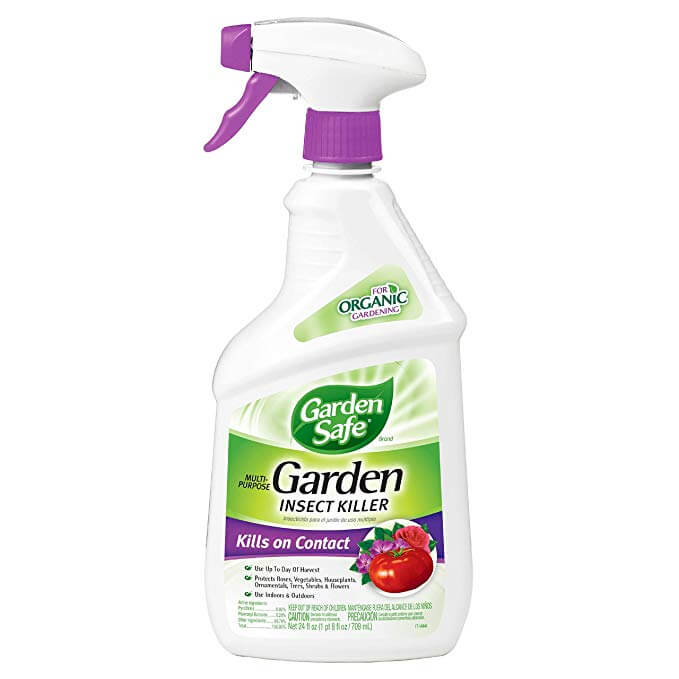
Garden Safe Insect Killer contains botanical insecticides, which are great for roses, vegetables, houseplants, trees, and shrubs.
When applied, this insecticide kills on contacts. It is the perfect insecticide to kill aphids, tomato hornworms, green fruitworms, and many other insects.
This is a safe product for indoor and outdoor plants and should be used weekly for up to 10 weeks.
Pros
- Inexpensive
- Non-toxic
- Indoor Use
Cons
- Not as effective as other insecticides
2. Dyna-Gro Neem Oil
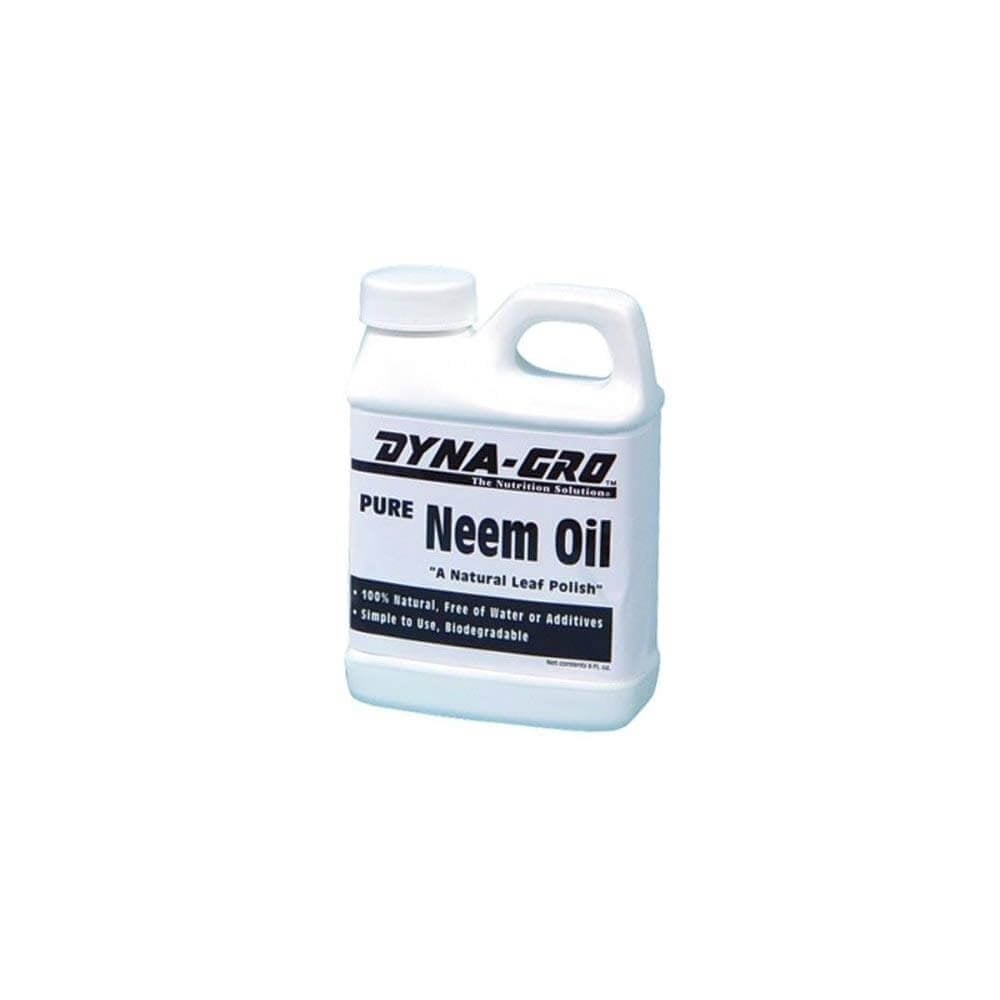
Dyna-Gro is a great multi-purpose bug killer. It is a perfect pest control solution for mites, flies, mildew, and more. In addition, it is a three-in-one fungicide, miticide, and insecticide.
This insecticide is a natural pesticide that works on all insects at any stage of their lives.
If you want to have the most success then use this insecticide as a dormant spray. This means apply in early spring before insects typically attack your vegetable garden.
Pro
- Inexpensive
- One of the most effective dormant sprays
- Multi-purpose spray
Cons
- Not effective once insects attack your plants
3. Safer Brand Insect Killing Soap
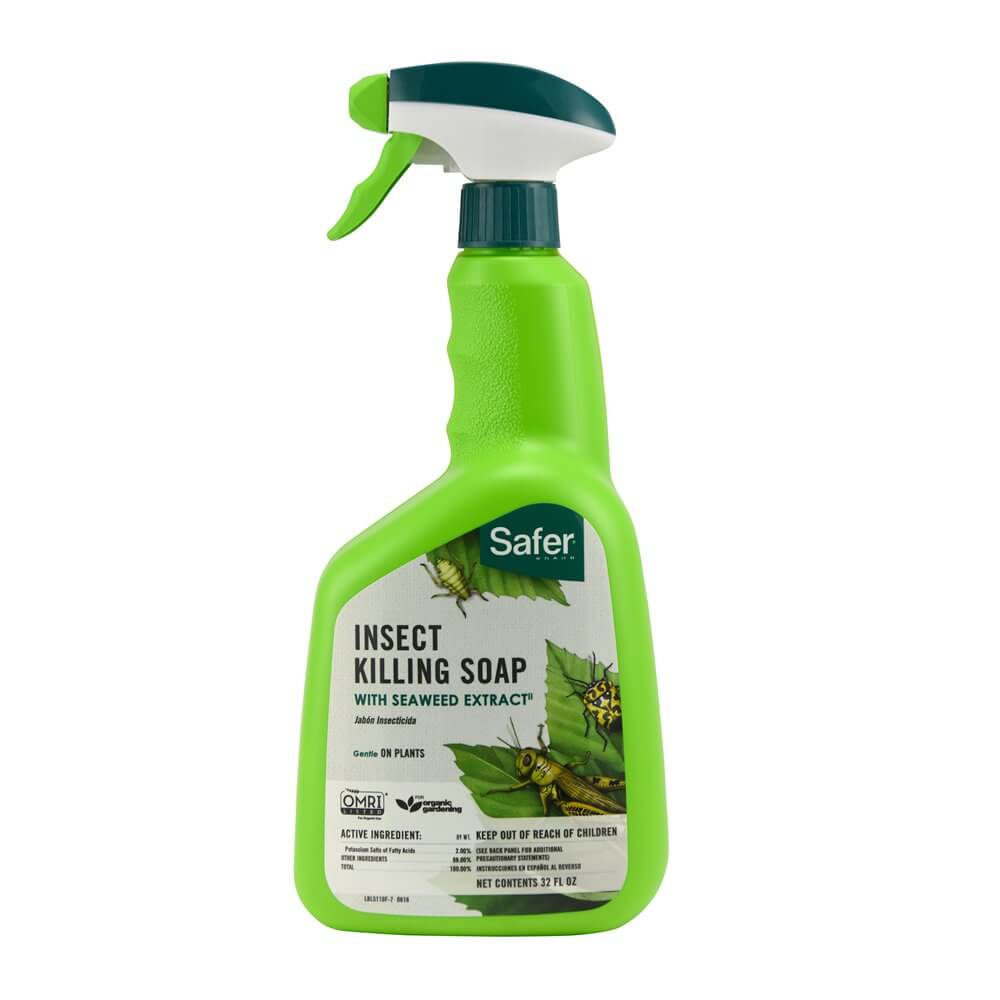
This is another great botanical option for killing insects in your vegetable garden. This insecticide kills aphids, earwigs, grasshoppers, leafhoppers, and mites.
In addition, this is a great insecticide for plant bugs, sawfly, spider mites, squash bugs, and whiteflies.
One of my favorite features of this product is that there is no residual impact on your plants and the environment.
Pros
- Great non-toxic option
- Reasonably Priced
- Effective against a wide range of insects
Cons
- Not as long-lasting as other insecticides on the list
4. Spectracide Immunox Insect Control
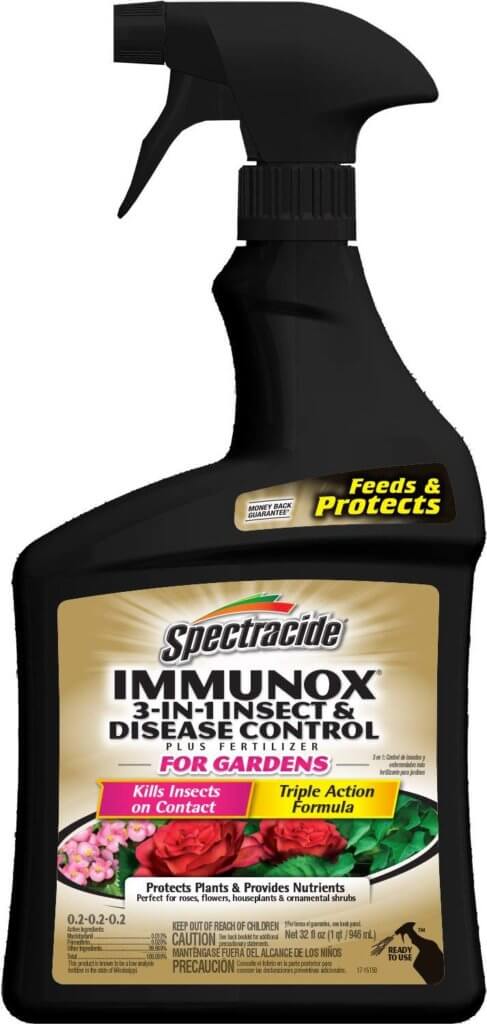
This insecticide is one of the few products on this list that has a triple action. Triple action means it is pest control, kills insects, and helps prevent disease.
In my opinion, this is one of the best products for your money. It kills insects on contact, protects plants, and provides nutrients.
It is perfect for roses, flowers, and houseplants.
Finally, this is a great product to not only kill insects but prevents and cures black spot, rust, mildew, and blight.
5. Bioadvanced Miticide Pesticide
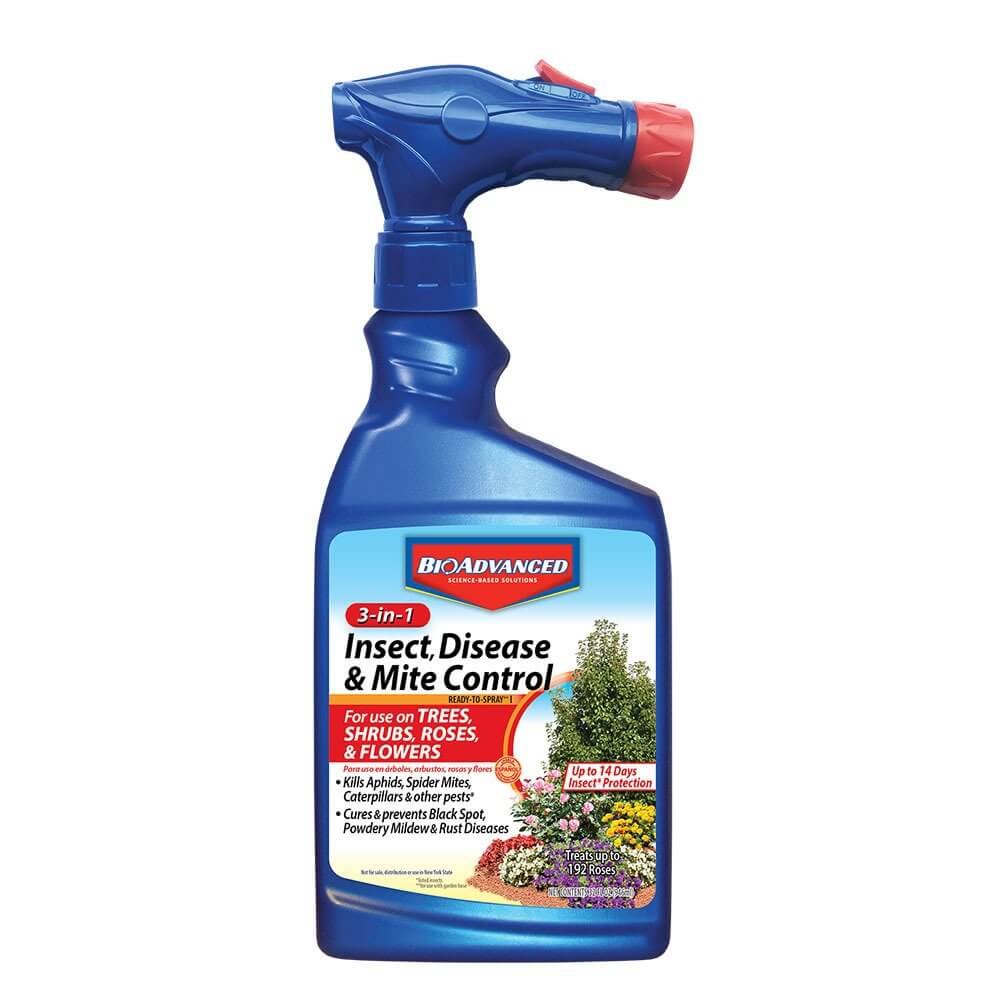
Bioadvanced Pesticide is another great 3 in 1 option.
This product is great for killing common insects that attack trees, shrubs, roses, and flowers. Some of the insects include aphids, caterpillars, beetles, whiteflies, and more.
In addition, this insecticide does a great job cures and preventing black spot, mildew, and other fungal diseases. Best of all is that it also kills mites and spider mites on contact.
Pros
- A great 3 in 1 insecticide option
- Kills some of the highest number of different insects
Cons
- There are other options that are as effective at a cheaper price
6. Ortho Home Defense Insecticide
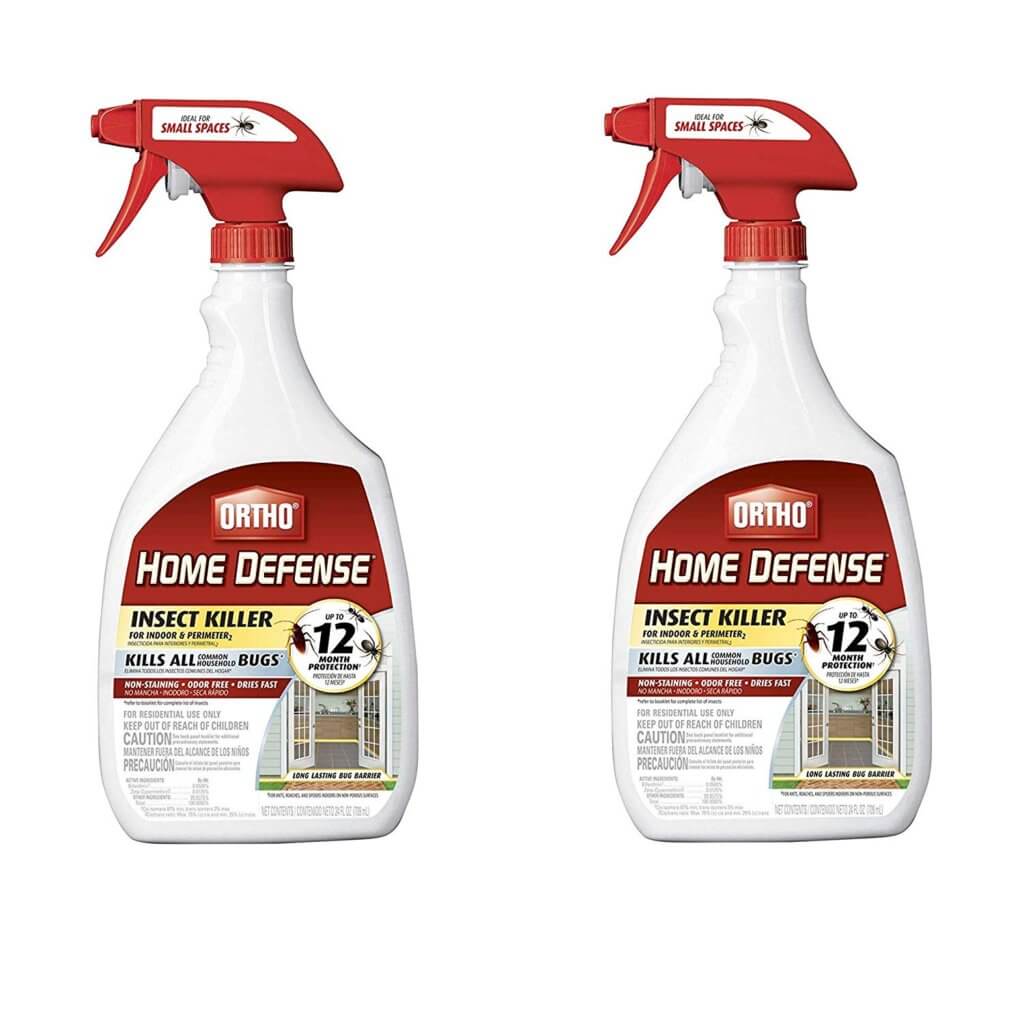
You have probably heard of Ortho Home Defense before, but thought it was just for your house.
Believe it or not, but this is a great insecticide for your vegetable garden. This is a great insecticide that works up to 12 months.
It controls ants, spiders, and cockroaches both indoors and outdoors.
One of my favorite things about this insecticide is that it is odor-free!
Pros
- Odor-Free
- Controls certain pests that other insecticides don’t
Cons
- Limited amount of insects it controls
7. Demon Max Insecticide
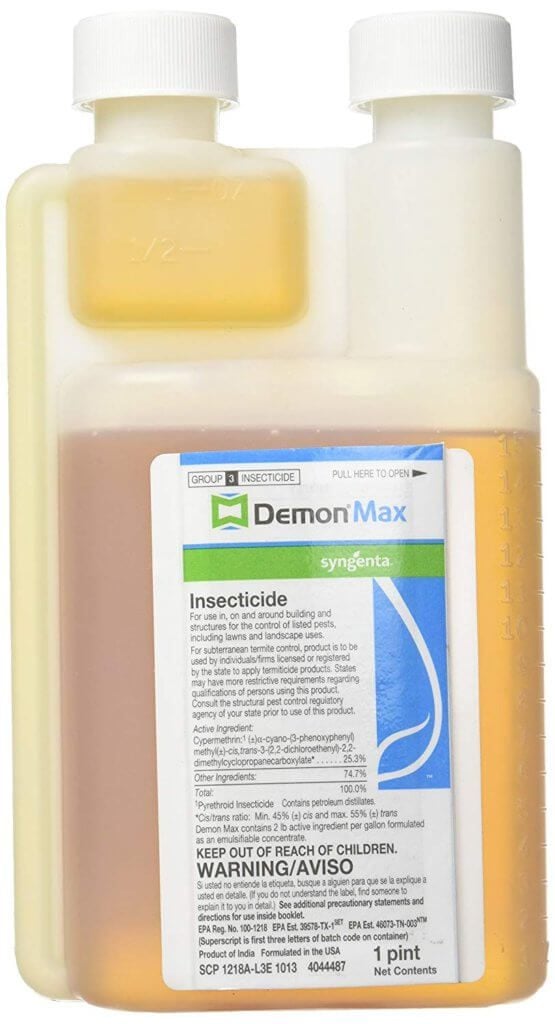
This product is one of the most long-lasting and effective insecticides on the list. It is also one of the few insecticides on the list that contains the toxic ingredient cypermethrin.
This insecticide makes up to 32 gallons worth of spray and protects your vegetable garden against both subterranean and Formosan species of insects.
Not only does it kill over 20 different pests, but it also repels numerous insects too.
Best of all is that this product has been known to control insects up to 10 years after spraying!
Pros
- Long-lasting
- Very effective against 20 different insects
Cons
- Not a botanical insecticide
8. CSI Insecticide
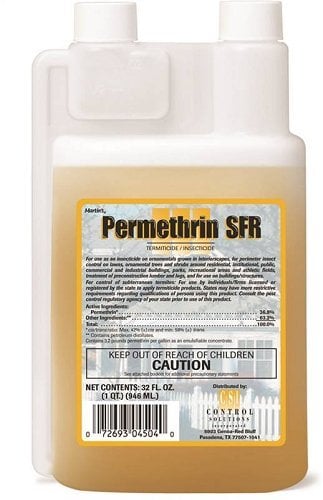
CSI Insecticide is another great option for gardeners who are looking for a long-lasting insecticide.
This is a long-lasting insecticide that has residual effects 90 days after spraying.
Not only is this a great product for your vegetable garden, but it can also be used in lawns, homes, sheds, etc.
This product is extremely effective against ants, bees, beetles, earwigs, flies, crickets, scorpions, ticks, and wasps!
Pros
- Extremely effective against numerous insects
- Long-lasting results
Cons
- Can stain clothes, furniture, etc.
9. Tempo Ultra Pest Control
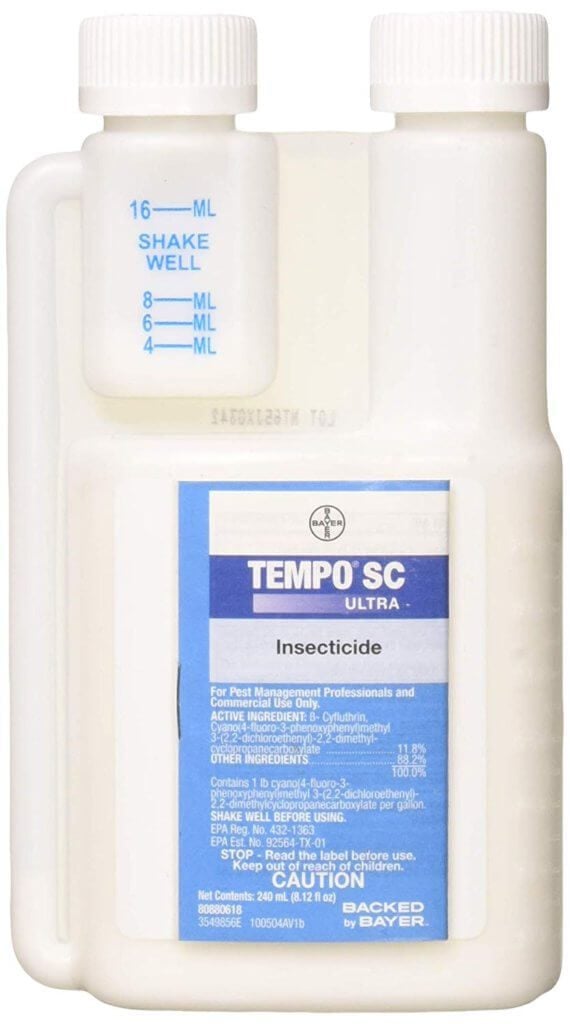
Tempo Ultra Pest Control is a no odor and non-staining insecticide that makes up to 30 gallons.
This is an incredibly long-lasting insecticide that can be used both indoors and outdoors.
Some of the pests that can be controlled are ants, aphids, armyworms, beetles, cutworms, borer, fungus ants, spider, thrips, and ticks.
One of my favorite things about this insecticide is that it is easy to use, less messy to handle, and is more evenly dispersed during application than other insecticides.
Pros
- Easy to Use
- Controls a much wider range of unique insects
Cons
- Cost
10. Bayer Suspend Insecticide
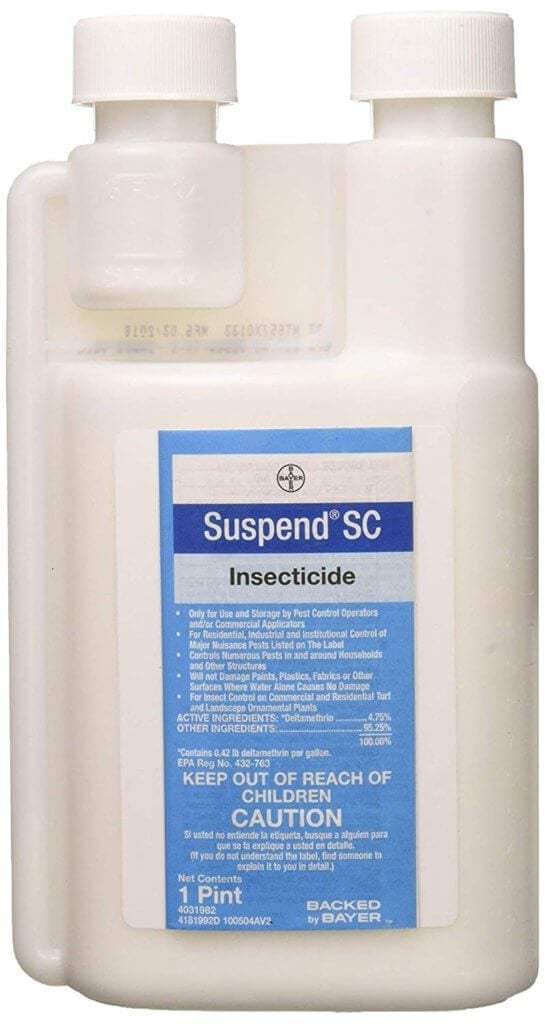
If you are looking for the best insecticide out there then this product may be for you. This insecticide is the same product that Pest Control companies use.
This mix can make up to 64 gallons of solution and is great for indoors and outdoors.
It kills over 50 nuisance pests and has no odor or residue and even works on porous surfaces!
Pros
- Commercial grade with long-lasting effects
- No odor or residue
Cons
- Cost
Bonus – DIY BEST Insecticide Options
While I personally use and recommend the above insecticides for your vegetable gardens for the best results, I also understand that certain readers may want to create their own organic ones.
For those wishing to DIY their own insecticide, I am listing the 5 best options below. While each of these takes a little bit of work, they are worth the effort.
It should be noted though that these are not as effective or lasting as products you can buy in the stores.
Soap Spray
- To make soap spray you will want to add 1.5 teaspoons of mild dish soap to 1 quart of water. After mixing you can apply it directly to your plants.
- This mixture will work against mites, aphids, whiteflies, and beetles
Vegetable Spray
- To make the vegetable spray you will want to add 1 cup of vegetable oil, one tablespoon of dish soap, and 1 quart of water together. After mixing, you can apply it directly to your plants.
- This mixture will work against mites, thrips, and aphids
Garlic Spray
- To make garlic spray you will want to take 2 garlic bulbs and puree them. After pureeing the bulbs add it to 1 quart of water, 1 teaspoon of liquid soap, and add 1/2 cup of vegetable oil.
- This will work against mites, thrips, aphids, beetles, wasps, and ants
Chile Spray
- To make chile spray you will want to take 2 chile peppers and puree them. After pureeing them add it to 1 quart of water, 1 teaspoon of liquid soap, and add 1/2 cup of vegetable oil.
- This will work against mites, ants, wasps, and aphids
Tomato Leaf Spray
- To make tomato leaf spray you will want to take 2 cups of fresh tomato leaves and 1 quart of water. After mixing you can apply it directly to your plants.
- This mixture works against mites, thrips, and aphids.
10 BEST Tips to Do Before Applying the BEST Insecticide
Typically, you can immediately apply your insecticide after you purchase it. If you want the best results though there are several things you should do before application.
Below, are the 10 BEST Tips to Do Before Applying Insecticide:
- Remove infected or weak plants. These plants can quickly spread their disease to other plants.
- Use organic soil, fertilizer, and compost. If you use potting mix, change it out every year. Fresh, organic soil typically limit the spread of pests and disease
- Rotate crops. One of the easiest ways to limit the risk of pests is to move where you plant your vegetables every year
- Use raised garden beds. And keep them close to your house. This again protects them against the elements like insects
- Remove debris. Any high grass, dead plants, and other debris is a breeding ground for insects
- Mulch. This is a simple one. Mulch around your vegetable garden to prevent a habitat that can encourage insects
- Clean your pruning tools. Again, another easy tip. Cleaning pruning tools help prevents the spread of insect diseases.
- Always wash your hands and clean your clothes. Again, insect disease can quickly spread from your hands and clothes to your vegetable garden
- Wear gloves, pants, and long-sleeve shirts. This will prevent any harm from agitating your skin
- Read the instructions. Most people never read instructions and hence never properly use their insecticide
5 BEST Insecticide Application Tips
Just like there are tips to have success before you apply your insecticide there are also several tips you should do during your application to have better results.
Below, are the 5 BEST Insecticide tips I personally use to have the best success.
- Buy and use a Chapin Sprayer. This will be the best $15 you ever spend. Easy to use, disperse more spray, and makes spraying much quicker.
- Apply your insecticide to a specific area. Many gardeners apply their insecticide to a large area, but the more specific and concentrated the better.
- Don’t apply to pets, food, etc. I know this may seem obvious, but gardeners still do it.
- Don’t burn wood for a month after application. Burning wood that has insecticide on it can quickly spread into the air and be harmful to you and the environment
- Apply at least 24 hours before a rain if you want to have the best results.
Conclusion
After reading this article you should not only have a great idea of the best insecticide killers, but also the best tips to do before application and during application.
In my opinion, I personally would recommend using Insecticide #10, Bayer Suspend Insecticide.
While this is the most expensive option, it is also the most effective against most insects. And while the price tag may make you take pause the amount of mixture that it makes will last you a lifetime!
In addition, I would take advantage of tips 1, 3, and 7 for things you should do before application.
Rotating crops, cleaning pruners, and removing infected plants is easy, cost-effective, and one of the most effective ways to control pests.
I also recommend using Tip #1 and 5 during your application of the insecticide for the best results.
Using a reliable sprayer and spraying before rain can not only save you time and money but will also give you the longest-lasting results.
If you enjoy this article then please read some of my other articles:
101 Gardening Tips that ACTUALLY Work
12 BEST Garden Fertilizers for ALL Plants
20 BEST Raised Garden Beds for ALL Plants